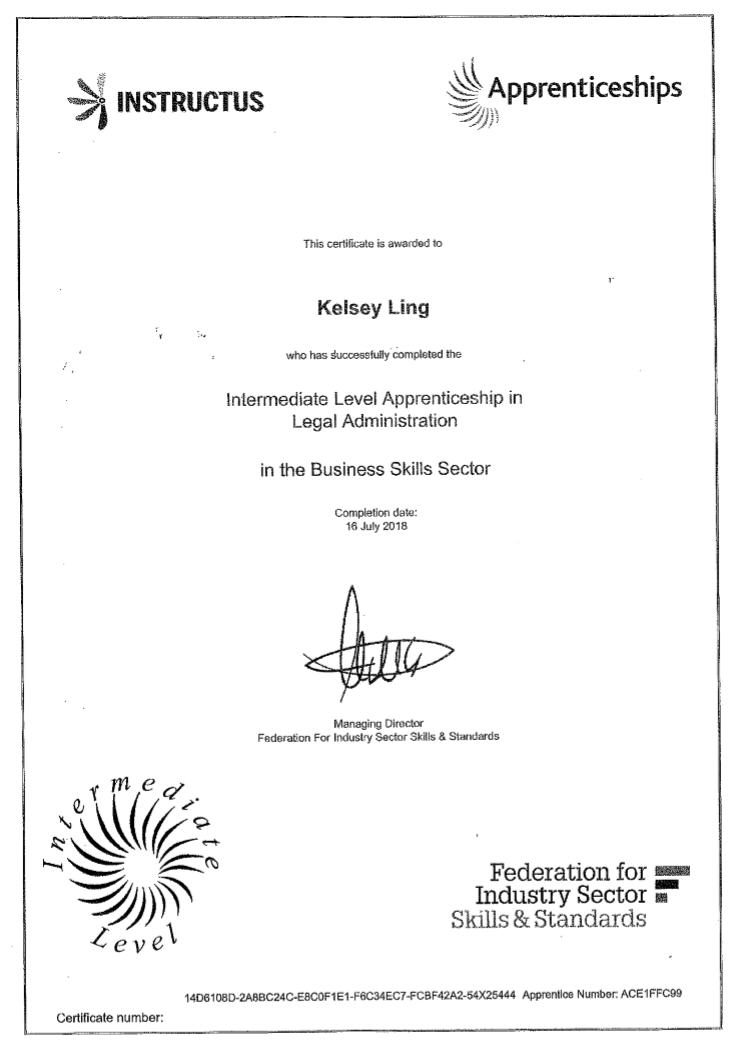Archive for month: July, 2018
What Is A Deed Of Variation?
/in Legal Updates/by Wills and Probate DepartmentYou may be surprised to learn that it is possible to alter someone’s Will after their death, providing that any beneficiaries left worse off by the changes agree. The changes can be made by what is known as a deed of variation.
If someone dies intestate (without a Will) then the intestacy rules govern who inherits. A deed of variation can also be used to change the inheritance in the same way as if there was a Will.
There are various reasons why it may be a sensible idea to change a Will or redirect inheritance under the intestacy rules. These include:-
- to reduce the amount of Inheritance tax (IHT) or Capital Gains Tax (CGT) payable
- to provide for someone who was left out of the Will
- to move the deceased’s assets into a Trust
- to clear up any uncertainty over the Will
Deeds of variation are a useful inheritance tax (IHT) planning tool because any inheritance from an estate that is redirected to others will be treated as if the deceased made the gift. This means that the person allowing the redirection does not have to survive the gift by seven years in order for it to fall outside of their own estate and therefore not be subject to IHT. A common example would be a child who is to inherit from their parent’s estate. If the child is already financially sound then they may not require the inheritance which would only increase the size of their estate, giving rise to further IHT charges on their own death. In this situation, the child may wish to redirect the inheritance to their own children who could benefit from the money.
A deed of variation could also be used to alter the division of a Will to benefit a charity. Making such a change could potentially attract a lower 36% rate of IHT of the estate that is chargeable which would reduce the IHT bill.
It is important to know that a deed of variation must be made within two years of the date of death. Furthermore, once a deed of variation is signed it cannot be revoked so it is paramount that careful consideration is taken before entering into a deed of variation.
For more information, please contact our Private Client department for expert and professional advice regarding wills and probate issues.
Hayley Ford, Private Client Solicitor
Protecting Victims Of Domestic Abuse In The Family Court
/in Legal Updates/by Emma LaidlawIn the past few years there has been much debate over the treatment of victims of domestic abuse in Court proceedings. The Criminal Courts have made important changes to ensure the victims of abuse are protected during criminal proceedings but the Family Courts have not implemented similar changes.
At present, if a perpetrator of abuse does not instruct a lawyer to represent them in Court proceedings then they will go before the Court in person. If the case progresses to cross examination then there is a risk that the perpetrator of the alleged abuse is able to question and potentially interrogate their victim about the alleged abuse. A Judge would do their utmost to limit the occasions when a perpetrator of the abuse can question their victim and will closely monitor the line of questioning, however the reality is that there is a genuine risk that the victim may be further abused under the cloak of Court proceedings.
In 2016 Women’s Aid published a report that dealt with the damaging effect this type of cross examination can have on a victim. It reported that many victims felt that their welfare and safety was being jeopardised by being interrogated about the abuse by the perpetrator. Some felt that the perpetrator of the abuse was being allowed to treat them in a degrading manner during cross examination and that further abuse was being allowed to continue through the Family Court process.
The report called for the Government and all Family Courts to make the court process safer for victims of domestic abuse. The report was part of the Child First Campaign which sought to ensure that the safety of children remains at the centre of all decisions made by Family courts.
Following this report, Women’s Aid were able to secure a commitment from the Government to create a new law banning alleged perpetrators of abuse from being able to cross-examine their victims in Family court proceedings. In February 2017 the Prisons and Court Bill provided for amendments to be made to current legislation to ensure that anyone with a current conviction for a domestic violence offence was prevented from cross examining their victim during Family court proceedings.
The Commons Public Bill Committee were scheduled to consider the Bill in April 2017 however following the announcement of the snap General Election on the 18th April 2017, the Bill was not able to progress and fell when the Parliament dissolved on the 3rd May 2017.
Despite this initial set back, the Queen’s Speech delivered on the 21st June 2017 made a commitment to introduce a Court’s Bill to reform the court systems and address the treatment of domestic violence victims during Court proceedings.
Following a consultation period from March to May 2018, Parliament is to debate the issue of the progress on protecting victims of domestic abuse on the 18th July at Westminster Hall.
Ahead of the debate Penny Scott, the Chair of the Family Law Committee at The Law Society, Margaret Heathcote, the National Chair of Resolution and Katie Ghose, the Chief Executive of Women’s Aid wrote a joint letter to the Lord Chancellor and Secretary of State for Justice, David Gauke MP calling for the Government urgently to ban cross examination of victims by their abusers in Family courts. The letter highlighted the fact that the perpetrator of the abuse interrogating their victim is in itself abusive.
It is with great hope that the Government will now take immediate action in respect of this long running debate to ensure that in the future, victims of domestic abuse will not have to experience further abuse in Family Court proceeding designed to protect them.
Thank You From Sawston Village College
/in News/by Sue LawtonWe received this very nice comment Sawston Village College, where Adams Harrison sponsor an award for their sports award evening.
I just wanted to say thank you for supporting our Sports Awards Evening which ran successfully this evening. These events are not possible without the support of Sponsors, like yourself, so thank you for investing the time and resources into our awards evening.
Many thanks,
Miss E Rogers, PE Teacher
Adams Harrison At Haverhill Show
/in News/by Jenny CarpenterAdams Harrison were proud to be one of the sponsors for the Haverhill Show on Sunday 15th July 2018.
By sponsoring £250 for the event it meant that various activities could be made available for children at a significantly reduced cost.
We like to get involved in local events. It was lovely to be able to be based on the Recreation Ground all day. Jenny Carpenter (Managing Partner), Sue Lawton (Practice Manager) and Cathy Buck (Legal Executive) were able to meet and greet a number of people and assist with some legal enquiries. Children enjoyed our free lucky dip.
We look forward to being involved again next year.
Bake Off Success For Adams Harrison Staff
/in News/by Jack StewartWe are pleased to present confirmation of who won this years Adams Harrison bake off event. It was a closely run thing and the top three bakes received some great comments from the local Saffron Walden Estate agents judging panel:
“Better than sex” – Max Cutsforth, Associate @ Cheffins
“Considering none of us like Lemon drizzle cakes it was blooming lovely” – Arkwrights
“We need more and the recipe” – Nick Bush, Associate Director @ Mullucks Wells
Here we are, top three:
- Shoshana Goldhill and her Banana breads in third place with an average score of 38/40
- Debbie Dearman with her brownies in second place with 38.5/40
- And this years winner is Emma Laidlaw and her lemon bundt cake with 38.8/40
We are counting up the monies still with some more coming in later today. Thank you again to everyone that took part and the winner will be receiving her prize shortly and will be able to decide which charity the monies raised will be sent to.
Thank you!!!
Jack Stewart
Solicitor
Equal Pay For Equal Work
/in Legal Updates/by Jenny CarpenterAs long as 45 years ago measures were first introduced in the UK to address the difference in pay between men and women carrying out the same or similar work. It is considered, however that only limited progress has been made in bridging the gender pay gap.
Up until the end of September 2014 the framework for policing gender pay issues was contained in the Equality Act 2010 which draws together the protection from the previous Equal Pay Act 1970 and the Sex Discrimination Act 1975.
A scheme of voluntary reporting was put in place for employers to publicise their pay but this appears to have been insufficient in order to promote pay transparency and attempting to achieve equal pay for equal work regardless of gender.
Since October 2014 there has been a new sanction for employers in place that Employment Tribunals can order if employers are found to have breached equal pay legislation. This sanction requires employers to carry out an equal pay audit and to make public the results.
Average pay for men is greater than that for women. The Office for National Statistics revealed that in 2016 the gap was 9.4% for full time employees (the lowest since records began in 1997, when the gender pay gap was 27.5%). The gap for all employees was 18.1%. This is because a higher proportion of women work part-time (41%, compared to only 11% of men), and part-time workers (both men and women) earn less per hour on average than their full-time counterparts.
The General Pay Gap Regulations came into force on 6 April 2017 and apply to large private and voluntary sector employers. This is defined as employers with 250 or more employees on 5th April each year.
Employers must publish their gender pay gap information on their own website and retain it on line for at least 3 years. The information also has to be uploaded to a government website.
If you consider you are being paid less than a colleague of the opposite sex in your work place when you are undertaking equal work you may have a claim under the Equality Act 2010. The work, when being compared, must fall into at least one of the following three categories – “like work”, “work rated as equivalent” and “work of equal value”.
We can advise you as to whether you are likely to have a successful equal pay case. If you are successful the Tribunal or court can make a declaration of your rights and/or require arrears to be paid. A declaration forces your employer to pay the same as your opposite sex counter part. Arrears can be paid for a period up to six years before your claim.
The Civil Liability Bill – What It Means For You.
/in Legal Updates/by Anton BilinskiParliament announced on the 5th July 2018 that legislation intended to reform the personal injury small claims sector looks set to be halted until at least September 2018.
Part of the proposed bill which is now due to come into force in April 2019 makes significant changes to the personal injury compensation system by introducing fixed tariffs to apply to Road Traffic Accident whiplash injuries. The insurance industry argue that these changes will result in savings for consumers in respect of car insurance premiums.
The draft order of the Civil Liability Bill sets outs the fixed tariffs for compensation for pain, suffering and loss of amenity payable for injuries lasting less than three months will be restricted to £225. That figure rises to £450 for injuries up to six months, and to £765 where the injuries last nine months. The maximum fixed tariff for a whiplash injury, applying where victims have suffered for up to 24 months, is only £3,725.
The draft order defines ‘whiplash injury’ very wide as a sprain, strain, tear or rupture of one or more of the muscles, tendons or ligaments in the neck or back. The effects may include, but are not limited to, pain in the neck, back, shoulders or arms, reduced mobility in the neck, back or shoulders, headaches, muscle spasms, or a swelling in the neck. Compensation can be awarded only where the claimant can produce evidence of the injury in a fixed cost medical report from an accredited medical expert.
Although not included in the bill, as it does not require primary legislation, is a rise in the small claims limits for personal injury cases. The government intends to raise the small claims limit for RTA cases from £1,000 to £5,000 and other personal injury cases, public or employer’s liability, from £1,000 to £2,000. This change can be made by secondary legislation and will be timed to coincide with introduction of the Civil Liability Bill. As a result of the fixed tariffs the vast majority of whiplash claims are likely to fall within the new £5,000 limit. These changes will result in claimant’s either dealing with the claim themselves, which the government think people can handle, or pay for a lawyer, if they want one from their limited damages.
We believe that changes need to be made to the Civil Liability Bill to stop injured people suffering the biggest hit to their rights in recent years. For now we will have to wait a bit longer to see whether or not the Bill will pass through Parliament. In the meantime we continue to support the campaigns against the changes proposed.
If you require assistance or advice regarding a personal injury claim then please contact Anton Bilinski.
Intestacy. What Happens If You Die Without Making A Will?
/in Legal Updates, News/by Sarah BruceIt is incredibly important to make a Will to ensure that your estate passes as you intend.
In England and Wales, there is a statutory set of rules which apply if you die without leaving a Will (Intestate) when your estate will be divided according to this set of rules, irrespective of your wishes. Your spouse/civil partner may not automatically receive all of your estate.
If you have children, grandchildren or great grandchildren
Your spouse/civil partner will receive all your personal possession, the first £250,000 of your estate in your sole name and a half share of the remainder of your estate in your sole name over this value.
The other half of your estate over this limit will pass directly to your children.
All children are treated equally including adopted children but step children will not be included.
They will receive their inheritance when they reach the age of 17 or if they marry or enter into a civil partnership before they are 18.
If your estate is worth £250,000 or less, your children will receive nothing.
If you are not married/in a civil partnership, or you have divorced or ended your civil partnership, your children will inherit the whole of your estate.
If you have separated but are still married/in a civil partnership, your spouse/civil partner may inherit, even though you no longer live together.
If you have no children, grandchildren or great grandchildren
Your spouse/civil partner will receive all your personal possession and the remainder of your estate.
Any assets your hold jointly will pass automatically to the surviving joint owner and will not be subject to the Intestacy Rules.
Social
Recent Posts
Other Links
Latest News
Business Hours
- Monday-Friday: 9am to 5pm
- Weekends: Closed
01799 523441 Saffron Walden
01440 702485 Haverhill
01223 832939 Sawston






